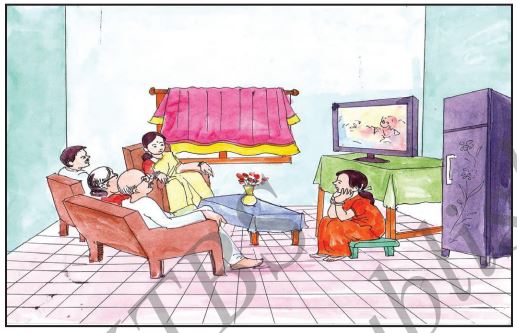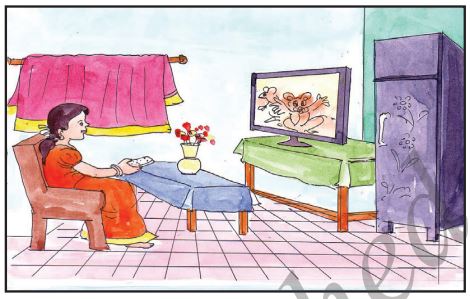NEST WITH GRAND PARENTS – Unit 7
Lalitha Sridhar
1. “Amma, why are you removing all my things from the cupboard?”. Anjali asked in a voice which sounded like she was ready for a fight.
“You already know, Anjali. Dada and Dadi need some place for keeping their things,” her mother replied firmly, without any apology.
2. “But, Ma, where will my things go? This has been my room since I was a baby. Why should I give up everything just because Dada and Dadi are coming to live with us?” cried Anjali.
apology – an expression of feeling sorry for something wrong that you have done, ಕ್ಷಮೆ, ಕ್ಷಮೆಕೋರಿಕೆ
couch – a piece of furniture used for taking rest; a sofa, ಸೋಫಾ, ಮಂಚ
accommodate – to arrange/provide a place to keep some things, or for somebody to live or stay, ಅವಕಾಶ, ಸರಿಹೊಂದಿಸು
sensitive – able to understand people’s feelings, ಸೂಕ್ಷ್ಮವಾದ
objection – an act of disagreeing with something or someone, ಆಕ್ಷೇಪಣೆ, ತಕರಾರು
3. “Come on, Anju. You are not giving up everything. You are only going to sleep on the couch in the hall instead of in this room. And your things can be accommodated elsewhere,” replied her mother, trying to be sensitive but feeling angry at her daughter’s objections.
migrate – to go and live in another place, ವಲಸೆ, ವಲಸೆ ಹೋಗು
chachaji – father’s younger brother, ದೊಡ್ಡಪ್ಪ
bua – father’s sister, ತಂದೆಯ ಸಹೋದರಿ
4. This is how it had been ever since Anjali had been told that her grandparents would be living with them now onwards. They had recently sold off all their land in the little village. Dada was nearing seventy now and was too old to run the farm all by himself. He had promised he would not leave his land till he died, but he was finding it more and more difficult to live there alone. All his children had migrated to cities. Two of Anjali’s chachajis were abroad. Only Papa lived in Pune while Rita Bua was in Delhi. Dada had been persuaded by Anjali’s father (Papa) to come and live with them. Papa wanted all of them to be together as a joint family.
5. Of course, Anjali enjoyed meeting her grandparents during her holidays, but that did not mean she was going to be happy giving up her room for them! Anjali was an only child. Never in her life had she liked sharing anything and she wasn’t ready to change now!
6. And so it was that when her grandparents came, Anjali was in her fussy, irritating, bratty mood. She made a show of how she had lost her room. When she wasn’t making rude comments, she would not talk much and pretend to be glued to her
favourite programme on TV. She was not very polite and complained, though not directly, for she was too afraid of her father’s wrath.

fussy – giving too much importance to little things, ಚಿಕ್ಕ ಚಿಕ್ಕ ವಿಷಯಗಳಿಗೂ ಹೆಚ್ಚಿನ ಮಹತ್ವ ನೀಡುವುದು
bratty – impolite, unruly, ತುಂಟ, ವಿನಯವಿಲ್ಲದ
wrath – great anger, ತೀವ್ರ ಕ್ರೋಧ
7. It was true that having grandparents living with them needed adjusting to a new routine. They (the grand parents) woke up much before anyone else did and that made things awkward. Dadi was forever doing some puja or other and if there was objection to onions in the food one day, it was eggs the next day.
8. They would not go with them to eat out at restaurants. They would not watch movies in theatres. They would not enjoy shopping just for fun. They thought strap dresses were too foreign and short skirts totally avoidable. Pop music was ‘noise’ and ice-creams were ‘not good for health’.
9. The one thing they did share was an addiction to television, but the programmes they watched put Anjali to sleep. Anjali felt as if she had suddenly been imprisoned. The house suddenly looked too small.
addiction – getting used to something and being unable to stay without it. ಚಟ, ದುರಾಸಕ್ತಿ
10. As the days passed, Anjali’s anger came down. It was impossible to remain angry with someone who was so kind. Dadi stopped commenting on her clothes and even bought her a pretty T-shirt when they went sightseeing. TV became a divided schedule of the most wanted programmes on each individual list. Dada helped Anjali with her projects and he was a big help with the Math syllabus. He also got Anjali into the habit of reading the newspaper. He read the headlines to her when he waited for her bus to arrive at the bus-stop every morning. Anjali’s mother worked in an office and she left along with her father every morning. Breakfast was always cornflakes and it was usually sandwiches for Anju’s tiffin. And when her mother got back in the evening, she was so exhausted that cooking food was never great fun.
11. But now Dadi had taken over the kitchen – she actually said she was getting bored of doing nothing! Dadi was a fantastic cook. Suddenly, they were served divine parathas and subzi, mithai and pakoras, salads and pickles. Anjali’s mother could now slow down a little and rest her feet. She even had more time for her daughter. She was also satisfied that her child was in the most caring hands possible….. till one day when the grandparents announced, “We are thinking of going to Rita’s place for a while.”
tiffin – a light meal, ಉಪಹಾರ ಮಾಡು
exhausted – very tired, ದಣಿದ, ಆಯಾಸದ
12. Before anyone could say anything, Anjali burst out, “Oh! Can I have my room back then? Dada- Dadi, when are you going?”
divine – wonderful, heavenly, ದೈವಿಕ
13. The silence that followed was terrible and only Dadi had some kind and general words to fill it with. Later, apart from her room, Anjali got the worst firing she had ever received from her parents. Anyhow, she had what she had wanted and, in two days time, they were a nuclear family again. But it was a lonely achievement. There was no one to come home to but the silly TV. There was no one to talk to. Her mother was again harassed and overworked with no time for anything, or anybody. But most of all, the noise and bustle of one big happy family had faded into silence. The house suddenly looked too big.

14. When the phone rang the following night, just like they had expected it would, it was Anjali who ran and picked it up to say, “Dada-Dadi, when are you coming back?”
ಸಂವೇದ ವಿಡಿಯೋ ಪಾಠಗಳು
SAMVEDA 7th Englisg Sl Nest With Grand Parents 1 of 3
SAMVEDA 7th Englisg Sl Nest With Grand Parents 2 of 3
Samveda 7th English Nest With Grand Parents 3 of 3
ಪೂರಕ ವಿಡಿಯೋಗಳು
Nest With Grand Parents | 7th standard English | Unit 7
ಪ್ರಶ್ನೋತ್ತರಗಳು
ಈ ಪಾಠದ ಪ್ರಶ್ನೋತ್ತರಗಳಿಗಾಗಿ ಮೇಲಿನ ಲಿಂಕ್ ಮೇಲೆ ಕ್ಲಿಕ್ ಮಾಡಿ.
Grammar Writing : Prepositions
Prepositions
Definition: A preposition is a word that shows the relationship between a word in the sentence and the word that is the object of the preposition.
You have just finished the Modifiers Module. You learned that adjectives tell which one, what kind, how much, and how many about a noun or pronoun. You learned that adverbs tell where, when, how, and to what extent about verbs, adjectives, and adverbs.
Sometimes the answers to those questions take more than one word. Often those phrases are prepositional phrases.
Which one: The flower in the vase is a peony.
What kind: The umbrella with the polka-dots is Mary Anne’s.
Where: We will be going to the movies.
When: My lunch period is after science.
How: You are walking on your tiptoes.
Prepositions can never be alone, so it makes sense to learn about prepositions in their phrases. Any lone preposition is actually an adverb.
A preposition is a word that shows the relationship between a word in the sentence and the word that is the object of the preposition.
In the previous examples:
In shows the relationship between the flower and the vase.
With shows the relationship between the umbrella and the polka-dots.
To shows the relationship between where we are going and the movies.
After shows the relationship between our lunch and science class.
On shows the relationship between how we are walking and our tiptoes.
| Some Common Prepositions | |
|---|---|
| Prepositions of time: | after, around, at, before, between, during, from, on, until, at, in, from, since, for, during, within |
| Prepositions of place: | above, across, against, along, among, around, at, behind, below, beneath, beside, between, beyond, by, down, in, inside, into, near, off, on, opposite, out, over, past, through, to, toward, under, underneath |
| Prepositions of direction/movement: | at, for, on, to, in, into, onto, between |
| Prepositions of manner: | by, on, in, like, with |
| Other types of prepositions: | by, with, of, for, by, like, as |
Most commonly used Prepositions in English (In KANNADA)
Learn Prepositions

